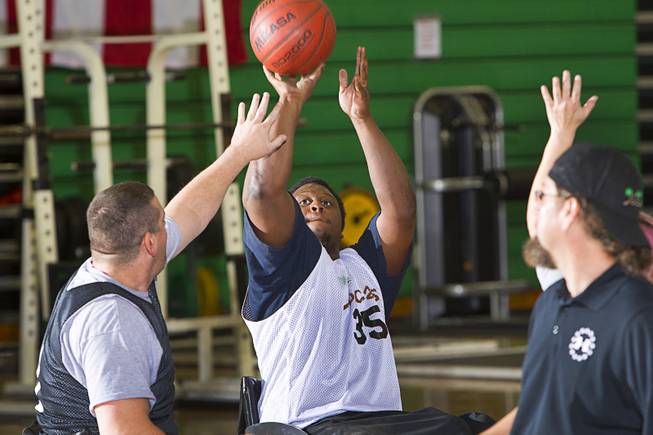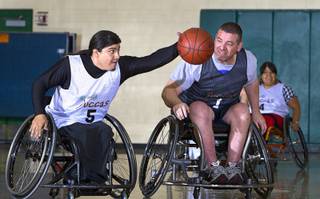
Marc Fenn, left, defends as Timothy Oliver takes a shot during wheelchair basketball practice at Rancho High School on Tuesday, Feb. 25, 2014. The team was practicing for a scrimmage against a Wounded Warriors team at Nellis Air Force Base on Thursday.
Thursday, Feb. 27, 2014 | 2 a.m.
Marc Fenn could feel the eyes staring at him the first time he rolled into public in a wheelchair.
He felt their glaze and pity as they looked at his broken body. He hated it. Only a few months prior, he was 20 years old, 6-foot-2 and built like a football player. He was a former Army paratrooper and a 13-time varsity letter-winner in high school, with two school records in discus.
Then he fell 30 feet from the roof of a building while working a part-time job, and it was all gone.
He couldn’t walk, couldn’t compete and had lost his purpose. People acted like his life was over, and he did too.
Then he discovered wheelchair basketball.
Fenn watched how the players crashed and battled and flew from their chairs with reckless abandon. There was no pity here, only pure competition. He felt like he belonged again.
“The camaraderie of going to that basketball team there helped open more doors because then you start realizing you’re not alone, you’re not by yourself,” Fenn said. “There’s other people going through the same stuff.”
More than 20 years later, Fenn, 43, has competed in a half-dozen sports, participated in two Paralympics and earned a silver medal for discus throw in 1996. Today, he plays for the Las Vegas Yuccas, a beginner-level wheelchair basketball team, and Fenn has become focused on spreading the gospel of wheelchair sports.
Why? Participation in sports boosts morale, Fenn said, and “it gives positive awareness to yourself and others around you.”
Inside the Rancho High School ROTC gym on Tuesday, the Yuccas scrimmaged in preparation for a game today against the Wounded Warriors at Nellis Air Force Base. The smell of burning rubber fills the gym as the Yuccas zoom down the court and crash into one another like bumper cars to make defensive stops.
The team is part of the city of Las Vegas’ Paralympic Sports Club. The Yuccas compete in a Division III league, which means the teams accept beginners — male or female — of any age.
Their last time out, the Yuccas lost by 30 to the Wounded Warriors Team, but that misses the point.
The game is designed to give recently wounded veterans a chance to adjust to life in a wheelchair through paralympic sports.
“Sports and/or recreation enhances a person’s quality of life,” said Jonathan Foster, Paralympic Sports Club director and Yuccas coach. “They have fun, they get stronger, it improves their quality life. It’s easier to get on and off the toilet.”
It’s that message that Fenn has been working to spread across the valley. He helped the basketball team get sponsored through the Paralyzed Veterans of America Nevada chapter and acts as a mentor with his teammates. While driving, he’ll often stop when he sees somebody in a wheelchair and introduce them to sports.
“Marc’s been vital in helping get this program started,” Foster said.
Fenn’s goal is to get an adaptive-sports recreation complex built and to include more veterans in the valley through the Las Vegas VA Medical Center. He knows the impact participatory sports can have on a former soldier used to being in their physical prime and part of a team.
“Sports saved my life,” Fenn said. “You find that ‘I can get into sports and I can still be competitive.'"
If nothing else, Fenn wants more visibility for wheelchair sports because it offers encouragement for people who become disabled like he did. He doesn’t want anyone to feel the same stares and hopelessness he felt 23 years ago.
“If we don’t have enough stuff out there, when you get hurt you go back to square one, where I was,” Fenn said. “But the thing is there’s enough media out there, enough organizations, so when you get hurt people don’t have to go, ‘Your life is over.’”


Join the Discussion:
Check this out for a full explanation of our conversion to the LiveFyre commenting system and instructions on how to sign up for an account.
Full comments policy